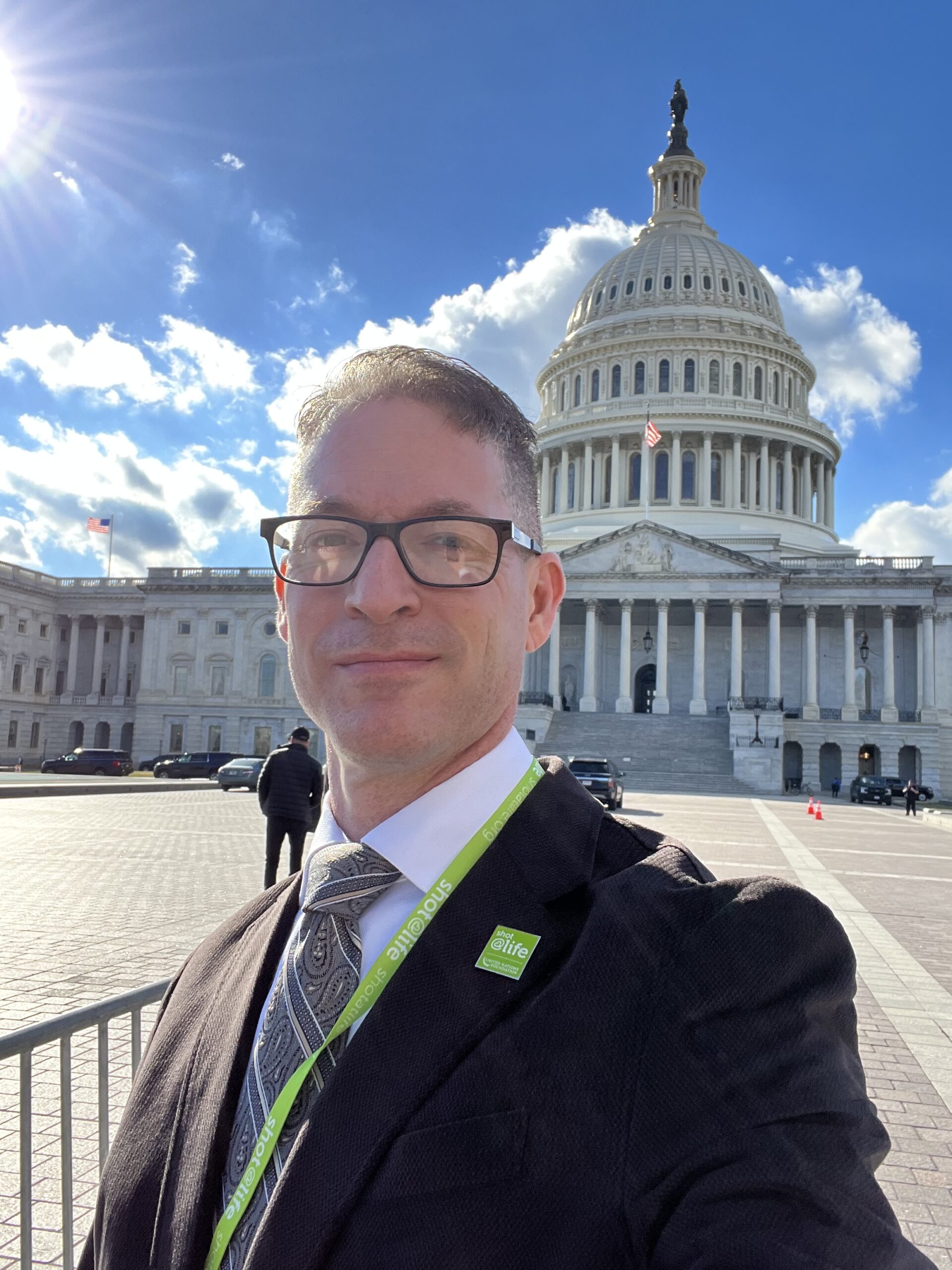Champions Spotlight: Jonathan Levenson
This Veterans's Day, we sat down with long time Shot@Life Champion Commander Jonathan Levenson to discuss his journey through vaccination advocacy. Jonathan is currently the Director for Healthcare Business at the Naval Medical Center Portsmouth and has served as a critical care nurse in the US Navy for 20 years.

Shot@Life: What brought you to Shot@Life, and what made you decide to choose to advocate for vaccinations?
Jonathan: It was a professor of mine at Old Dominion University who introduced me to Shot@Life: Janice Hawkins. I’ll give her the big shout out here, because she’s an outstanding advocate and a really good teacher. So when she offered the opportunity and I started looking at it, it was a really interesting project to get into. I had just gotten done with the mass COVID vaccines for active duty military, and that was an eye-opening experience to the power, the need for vaccines, and the need for us to strongly support this. I want to do the best I can to advocate going forward. I have a lot of desire to stay involved with policy and advocacy, and this was a really great program to get your feet in the door, get your feet wet, and start to learn how this actually works.
How do you feel that your work within the military has influenced how you approach advocacy at Shot@Life?
That particular experience in the military made it very easy for me and also made me understand the strength of direct communication. When you take the time and talk to people directly in an empathetic way and listen to what’s going on it, it really breaks down total barriers. Getting into conversation with what we refer to in the Navy as the “deck plate leadership” and saying “this is important, this is why we break down barriers,” and bring it right to them.
It was humbling and also very powerful to see those changes right where that vaccine needed to be, right where those people need to be. They may not have taken it, but they heard what we were saying. You could see people being grateful that we talked to them directly and didn’t bully them, didn’t directly order them, and didn’t mandate them. We said we hear what you’re saying, and we understand what’s going on. We wanted to give them the real story of what’s happening and help assuage those fears, to help sway the problems that we have with all kinds of vaccine disinformation.

Do you feel like there are any educational gaps that policymakers are missing in terms of how they’re coming up with policy for vaccinations? Is there something you believe Congress should prioritize when they’re analyzing how to roll out vaccination programs?
I don’t know if it’s an education gap per se. I think policymakers are smart people, so I don’t think it’s an education thing. I think they know a lot. The Kaiser Health Foundation podcast I listened to yesterday touched on a major problem, which is when we have ideas of anti-vaccinations, and we get that tied into the political affiliation. It makes it really hard to break those two apart. I think the scary thing is if I was looking at a policymaker and saying it’s probably best to not have anti-vaccination as part of our political discussion. It really needs to stay in a community medical discussion and public health conversation. Once we get it there, it’s very hard to separate the two. It’s more of a cultural change, and it’s much harder to come across a culture change.
How do you feel that COVID has shaped the approach to vaccinations amidst the prevalence of anti-vax discussions? What are some things that you wish people would know as we head further into that type of discourse?
The positives that have come out of this are a lot of questions and a lot of information. I like the inquisitive curiosity with people about vaccines in general. COVID was the new thing, and it did spur a lot of conversations and some questions about what is this really about? It’s fun when people get inquisitive, and you start giving them information saying, hey, this isn’t quite what they think it means. If you’re being inquisitive, I’m going to give you resources where you can go and find more information from a lot of different places so they can start becoming educated consumers.
The downside of that is that there’s so much information out there, and it’s not all valid. I think it’s really wild that from my particular state, Ohio, we were having a lot of problems with the reemergence of some vaccine preventable diseases. In conversations with our elected representatives, some of them didn’t realize the severity and the impact of that. I think someone in our position, such as the advocates for Shot@Life, bring information to these conversations on the ground. Doing this is the powerful trick.

With somebody as extensive of a military background that you have, is there anything you could see changing in terms of veteran health programs or even programs within the military that would help push towards a bigger vaccination program? Do you think there could be any room to work within that area?
It is an interesting distinction between the veteran’s health care and the military health care. Though related, they are separate systems. There’s a silo there that’s hard to break through. One thing I always like to push and try to get people to understand is that health care sees the final result of things that are outside healthcare’s control. Mental health, obesity, diabetes, etc. where we don’t have as much effect on the outside of the hospital walls than what are causing the problems that we’re seeing inside. If a veteran is suffering from mental health issues, and they’re homeless, seeing a mental health provider is only going to do so much if they’re homeless. That’s the problem. We need to get resources to that point. Same thing with vaccines. If we can’t get it to them in the military or to veterans, with breaking down all the administrative hurdles that they have to go through, we’re not going to make a lot of headway. I still think we owe a lot of trust from our beneficiaries, from our veterans. They want to be here. But we don’t always have the availability and the capacity that we need because we’re getting spread in a lot of different places.
Do you have any advice, or anything insightful for members who may be new to Shot@Life, or maybe just new to advocacy in general? What do you think are some important things to keep in mind when you are getting involved with programs such as Shot@Life?
The first part is take a really good deep breath and chill. It is really scary or intimidating to think you’re going to walk into the halls of Congress and talk about something that has a lot of information to give out in the five minutes that get. There’s a lot of friends, and this is a team sport, so we got you. Second one is don’t be afraid to try to establish a relationship. Remember that they are your elected representatives, and they work for you. They know that. If you come at them as a person, it’s so much easier. So it’s understanding that if we take a breath and realize this is a team sport, it will be exciting. You have so much fun going out there and talking with people or even just reaching out to them. The final one, and I think Mr. Rogers always said it best, is if you love something that you’re doing, it’s gonna be pretty easy.
Want to become a vaccine advocate like Jonathan? Sign up to become a Shot@Life advocate here.

